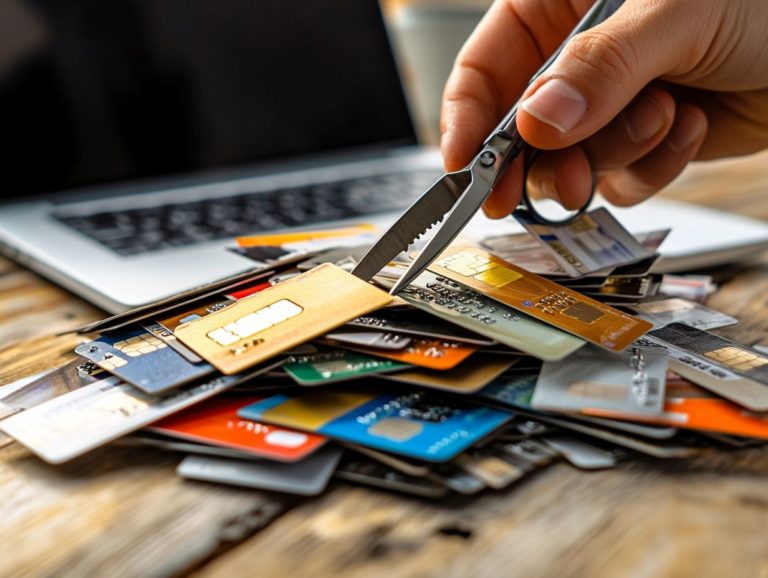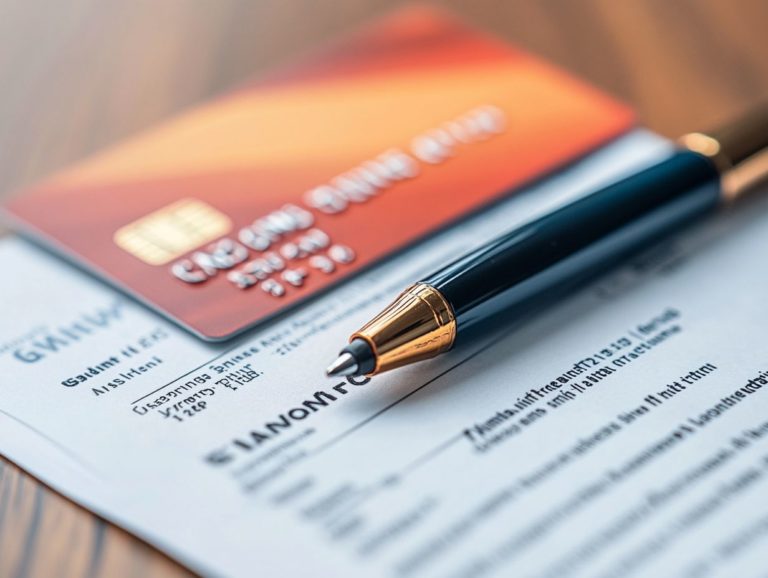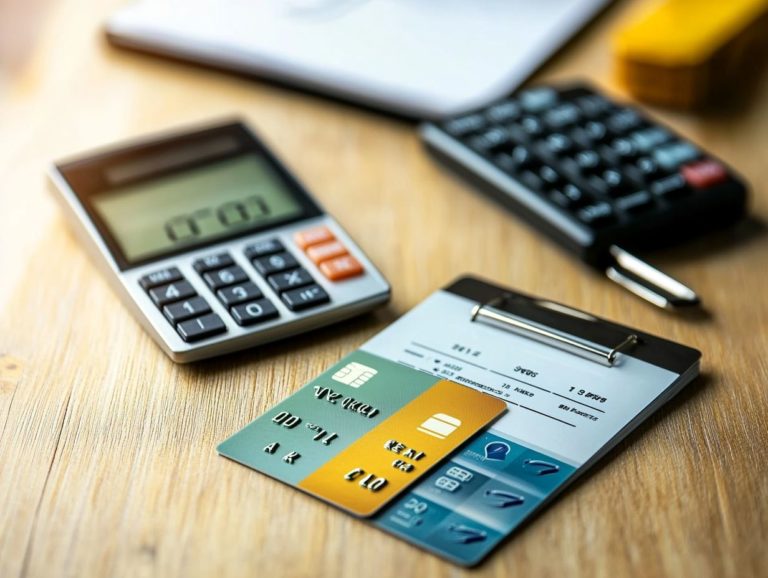What Is a Prepaid Credit Card?
Prepaid credit cards are becoming increasingly popular as a flexible alternative to traditional credit cards. They provide convenience without the looming threat of debt.
Unlike regular credit cards, prepaid options allow you to load a set amount of money for spending. This simplifies budgeting and enhances your security.
This article delves into what prepaid credit cards are, how they function, their benefits and drawbacks, tips for effective use, and alternative payment methods.
If you’re excited to learn about a smart way to manage money, keep reading!
Contents
- Key Takeaways:
- Understanding Prepaid Credit Cards
- How Prepaid Credit Cards Work
- Benefits of Using a Prepaid Credit Card
- What to Watch Out For with Prepaid Cards
- Choosing Your Perfect Prepaid Card Made Easy!
- Tips for Using a Prepaid Credit Card Effectively
- Alternatives to Prepaid Credit Cards
- Frequently Asked Questions
Key Takeaways:

- A prepaid credit card is a payment option that allows users to load funds onto the card and use it for purchases, just like a traditional credit card.
- Using a prepaid credit card can offer convenience and security, as users do not need to carry cash or worry about overspending.
- However, prepaid credit cards may have drawbacks such as a lack of credit-building opportunities and potential fees. It’s important to choose the right card and use it effectively to avoid these pitfalls.
Understanding Prepaid Credit Cards
Understanding prepaid credit cards is crucial for making informed financial decisions. These cards offer a secure alternative to traditional debit and credit cards. They enable you to load funds onto the card before making purchases.
Unlike debit cards, which are tied to your bank account, prepaid cards aren’t directly linked to a checking account. This gives you a distinctive tool for managing your spending without the risk of debt.
Prepaid credit cards are often issued by major companies like Capital One, Visa, and Mastercard. This ensures their widespread acceptance at point-of-sale systems.
Definition and Basic Functionality
A prepaid credit card is a simple payment option that allows you to load funds onto the card before making purchases. This sets it apart from traditional debit and credit cards linked to a bank account or a credit line.
This feature enables you to spend only what you ve preloaded, transforming it into an effective budgeting tool. Unlike debit cards that draw directly from your existing bank balance or credit cards that permit borrowing up to a specified limit, prepaid credit cards combine convenience with a sense of financial control.
You can make purchases in-store or online without the worry of overspending since you can t incur debt beyond the loaded amount. Plus, many of these cards can be reloaded, offering a versatile option for various financial needs.
How Prepaid Credit Cards Work
Prepaid credit cards operate by allowing you to load funds onto the card, which you can then use for a variety of transactions. To get started, simply purchase a prepaid card from a financial service provider and load it using a reload pack (a pack that allows you to add cash) or through direct deposit.
Once the funds are on the card, you can use it just like a debit or credit card, making purchases or withdrawing cash at ATMs. It’s crucial to regularly check your balance to avoid overspending, as these cards don t come with an associated line of credit.
Process of Loading and Using Funds
Loading funds onto your prepaid card is a straightforward process. Start by selecting a card from reputable financial service companies. You can use various methods be it cash, direct deposit, or bank transfers to add money, allowing for seamless transactions.
In addition to these conventional methods, you might also explore reload packs offered at participating retailers. This provides you with a convenient way to add cash. Once your card is loaded, it s ready for immediate use whether for purchases, bill payments, or online transactions.
With direct deposit, you can have your paycheck or government benefits automatically transferred to your prepaid card. This ensures that your funds are always readily available without the hassle of frequent trips to the bank. Streamlining this funding process enhances usability and makes prepaid cards an appealing choice for managing your finances with ease.
In conclusion, prepaid credit cards offer a flexible, secure, and convenient way to manage your money. By understanding their features and benefits, you can make informed decisions that align with your financial goals.
Benefits of Using a Prepaid Credit Card
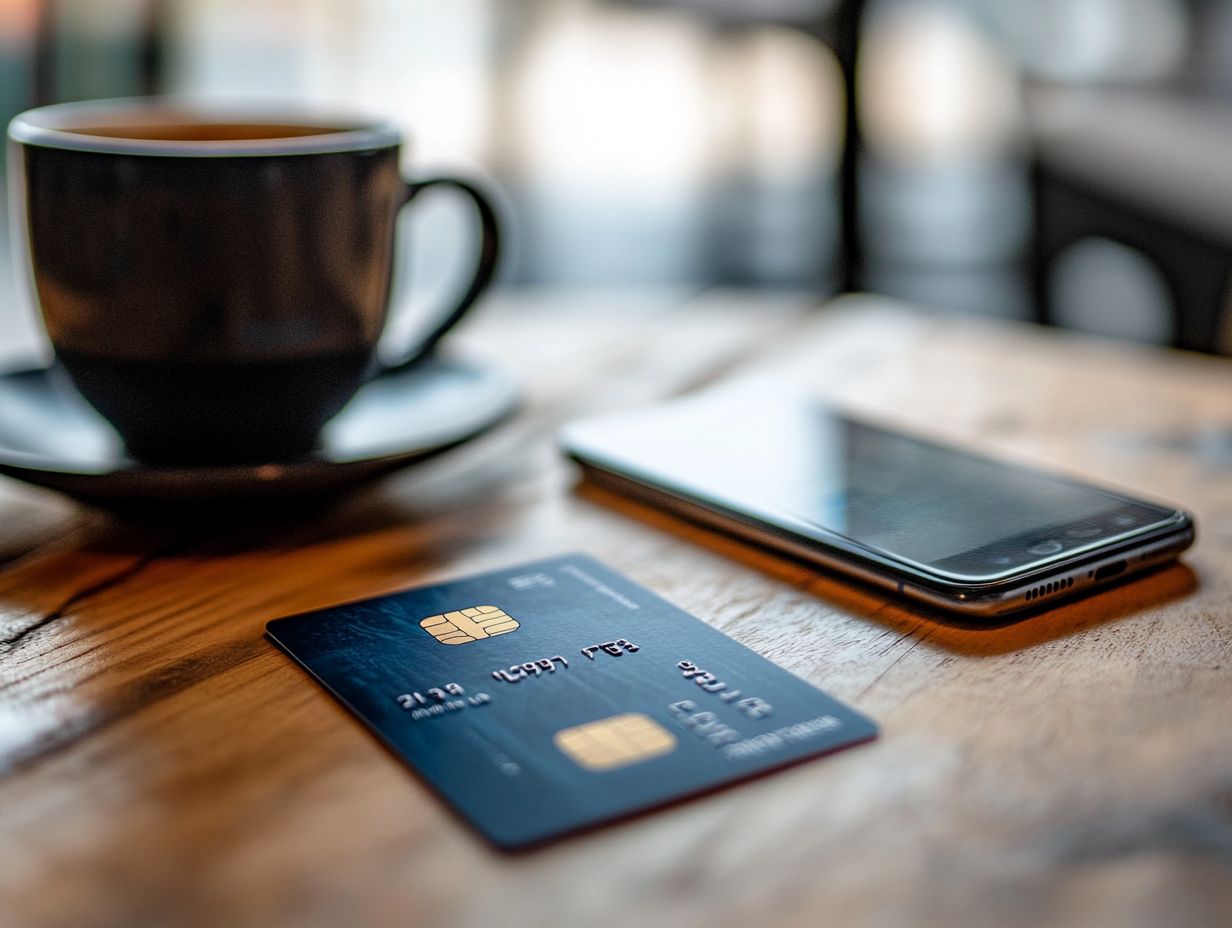
Using a prepaid credit card offers many benefits that improve your finances. These cards serve as an excellent alternative to carrying cash, enabling seamless transactions at a multitude of locations, including grocery stores and pharmacies.
Prepaid cards effectively cap your spending, making them a smart way for those looking to maintain control over their budgets. Many of these cards also feature consumer protections and the opportunity to earn rewards, transforming them into a valuable asset for managing your everyday expenses.
Convenience and Security
Prepaid credit cards provide you with remarkable convenience and security. You can make online purchases without the hassle of carrying cash, safeguarding you from the risks of theft or loss associated with physical money.
With a prepaid card, you can effortlessly shop from your favorite websites or apps without the anxiety of exposing your bank account details. You have the option to load these cards with specific amounts, enabling you to manage your spending more effectively.
For example, if you re budgeting for a special occasion or planning a trip, you can preload an exact sum, ensuring you won t face any unexpected expenses.
They also work seamlessly for international transactions, eliminating the need for currency exchange, which often comes with pesky high fees and inherent risks. Prepaid cards enhance your shopping experience by marrying safety with flexibility, making them a smart choice for the savvy consumer.
What to Watch Out For with Prepaid Cards
While prepaid credit cards offer certain benefits, it’s essential to weigh their potential drawbacks carefully. One significant concern is their inability to help you build credit; they don t report your transactions to credit bureaus, agencies that track your borrowing history, meaning your financial history won t get a boost from using them.
They often carry fees for reloading, monthly maintenance, or ATM withdrawals, which can accumulate over time. It s wise to be mindful of spending limits, as these restrictions can cap the amount you re able to load onto the card at any moment.
Lack of Credit Building and Potential Fees
Prepaid credit cards don t help you build credit because they don t report your usage to credit bureaus. This means you could be missing out on valuable opportunities to enhance your financial reputation.
The lack of credit building can hinder your chances of securing loans or obtaining favorable interest rates down the line. Lenders typically rely on credit scores to assess financial responsibility. Without a solid score, you might find yourself at a disadvantage.
Many prepaid cards come with hidden costs, such as the fees charged when you first set up your prepaid card, monthly maintenance fees, and transaction charges for ATM withdrawals or purchases. Be cautious! These fees can quickly add up, significantly depleting your available balance and impacting your overall financial wellness.
So, while these cards might seem convenient, it s crucial to consider their long-term effects on your budgeting and economic mobility.
Choosing Your Perfect Prepaid Card Made Easy!
Selecting the ideal prepaid credit card requires a careful assessment of several factors that align with your financial needs. Start by diving into the various fees associated with different cards, including monthly maintenance fees, reloading charges, and ATM withdrawal costs.
It s also essential to consider the card issuer’s reputation. Do they offer helpful features like mobile apps for easy balance checking or enticing rewards programs? Additionally, take note of the locations available for reloading the card.
By comparing various options, you ll enable yourself to choose a card that perfectly complements your spending habits and financial aspirations.
Factors to Consider and Comparison of Options
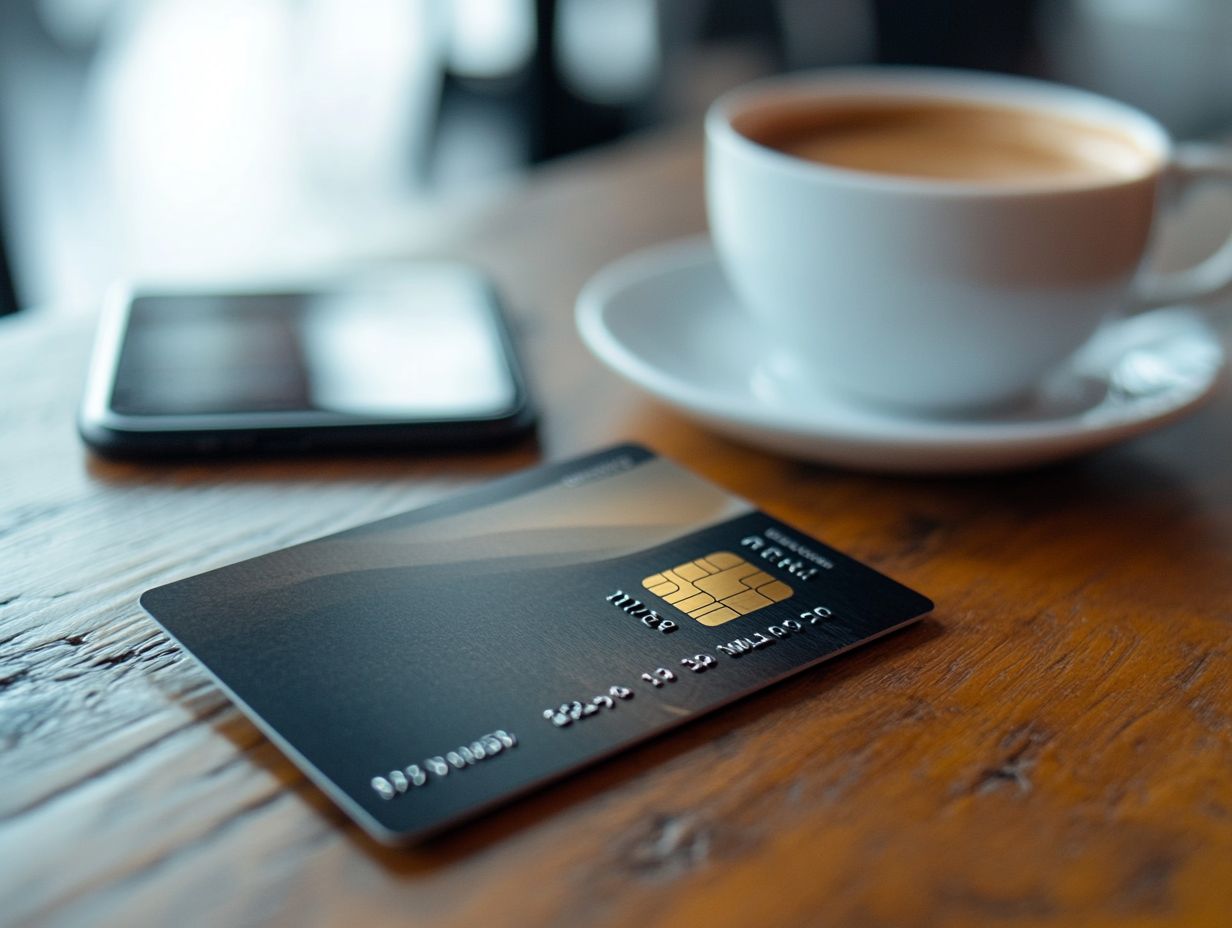
When you re choosing a prepaid credit card, there are essential factors to weigh, including fees, features, and the overall value it offers compared to other payment options on the market.
Grasping the different costs tied to prepaid cards is vital, as these can sometimes encompass monthly maintenance fees, transaction fees, or reload charges that can accumulate faster than you might expect.
Features like online tracking capabilities and budgeting tools can elevate your card’s usability. Rewards programs also add significant value.
It s also wise to compare these prepaid options against traditional checking accounts, debit cards, and digital wallets to pinpoint the best match for your unique financial needs. More importantly, assessing how each of these products aligns with your spending habits will enable you to make a well-informed decision.
Tips for Using a Prepaid Credit Card Effectively
Make the most of your prepaid credit card! To do so, embrace strategies that enhance its advantages while steering clear of common pitfalls.
Begin by routinely monitoring your balance; this practice will help you avoid overspending and maintain a clear understanding of your fund allocations.
Develop healthy spending habits to remain within budget during purchases, especially when using the card for online transactions. Set up alerts for low balance notifications. This way, you can effortlessly track your spending and sidestep any unexpected shortfalls.
Maximizing Benefits and Avoiding Pitfalls
Maximizing the benefits of a prepaid card requires a keen understanding of its features and implementation of strategies to sidestep common pitfalls that could lead to overspending or unexpected fees.
By diving into the terms associated with these financial tools, you can avoid unpleasant surprises like activation and monthly maintenance fees, which can swiftly erode the card’s value.
Regularly monitoring your transaction history is a wise move, helping you keep track of spending to ensure each purchase aligns with your budget.
Setting up alerts for low balances acts as a timely reminder to reload when necessary. Reviewing your usage patterns can uncover opportunities for more effective savings. By engaging in these practices, you not only enhance your experience but also cultivate a sense of financial discipline.
Alternatives to Prepaid Credit Cards
While prepaid credit cards come with distinct advantages, you might want to explore several alternatives that align better with your financial needs.
Debit cards are convenient and straightforward, providing access to your checking account without the hassle of cash. On the other hand, credit cards can help you build your credit history and provide a line of credit for unexpected emergencies.
If you’re looking to enhance your credit score, secured credit cards can be a great choice, as they require a cash deposit as collateral. Each option presents its own set of pros and cons, so it s crucial to evaluate your financial habits before making a decision.
Other Payment Options and Their Pros and Cons
Exploring various payment options, such as debit cards, credit cards, and even cash, unveils their respective pros and cons compared to prepaid cards, ultimately enabling you to make informed choices tailored to your financial needs.
Each option comes with its own unique features and fees, making it essential for you to weigh the benefits against the potential drawbacks. Debit cards offer convenience and direct access to your funds, but they might lack the rewards and protections that credit cards provide.
On the other hand, credit cards can deliver enticing rewards and help you build a credit history, although they do carry the risk of accumulating debt if not managed with care.
Cash, while free from fees, limits your tracking capabilities and can be a bit cumbersome in today s digital world. By grasping these distinctions, you can confidently select the payment method that aligns best with your lifestyle and financial aspirations.
Frequently Asked Questions
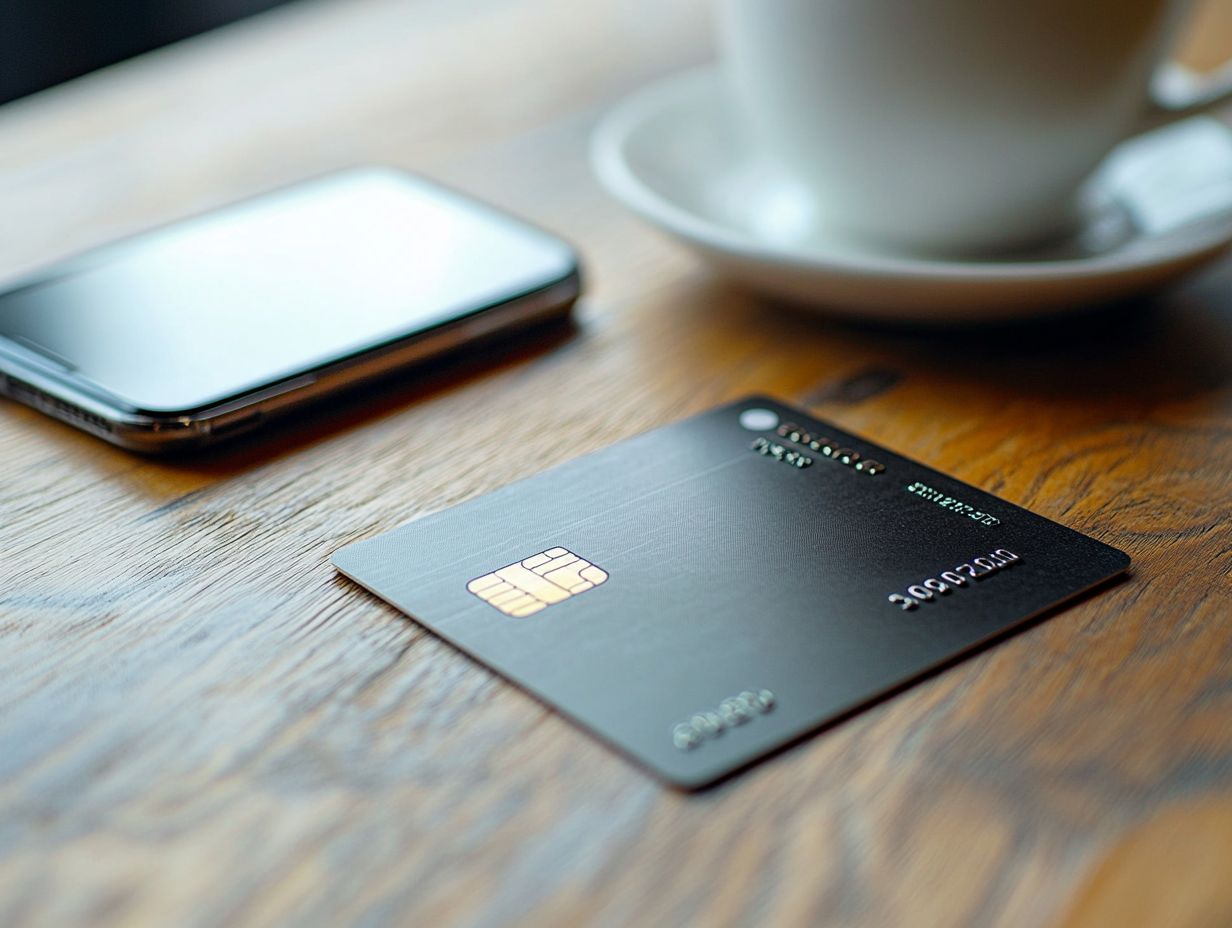
What Is a Prepaid Credit Card?
A prepaid credit card is a payment card that is loaded with a specific amount of money in advance. It is not linked to a bank account and can be used for purchases the same way as a traditional credit card.
How does a Prepaid Credit Card work?
With a prepaid credit card, you load money onto the card. You can then use it to make purchases until the balance runs out.
What are the benefits of using a Prepaid Credit Card?
Using a prepaid credit card helps you avoid overspending and debt. You don t have to go through a credit check, and you can shop online or in-store without sharing personal information.
Can anyone get a Prepaid Credit Card?
Anyone can get a prepaid credit card because there is no credit check. This option suits those with limited or poor credit history and helps with spending control.
What fees are associated with a Prepaid Credit Card?
Prepaid credit cards may come with activation fees, monthly maintenance fees, ATM withdrawal fees, and reload fees. It’s crucial to read the terms and conditions before choosing a card.
Are there any drawbacks to using a Prepaid Credit Card?
A prepaid credit card may not help build credit history like traditional cards. Some may also have hidden fees, so choose one with clear terms and fees.

